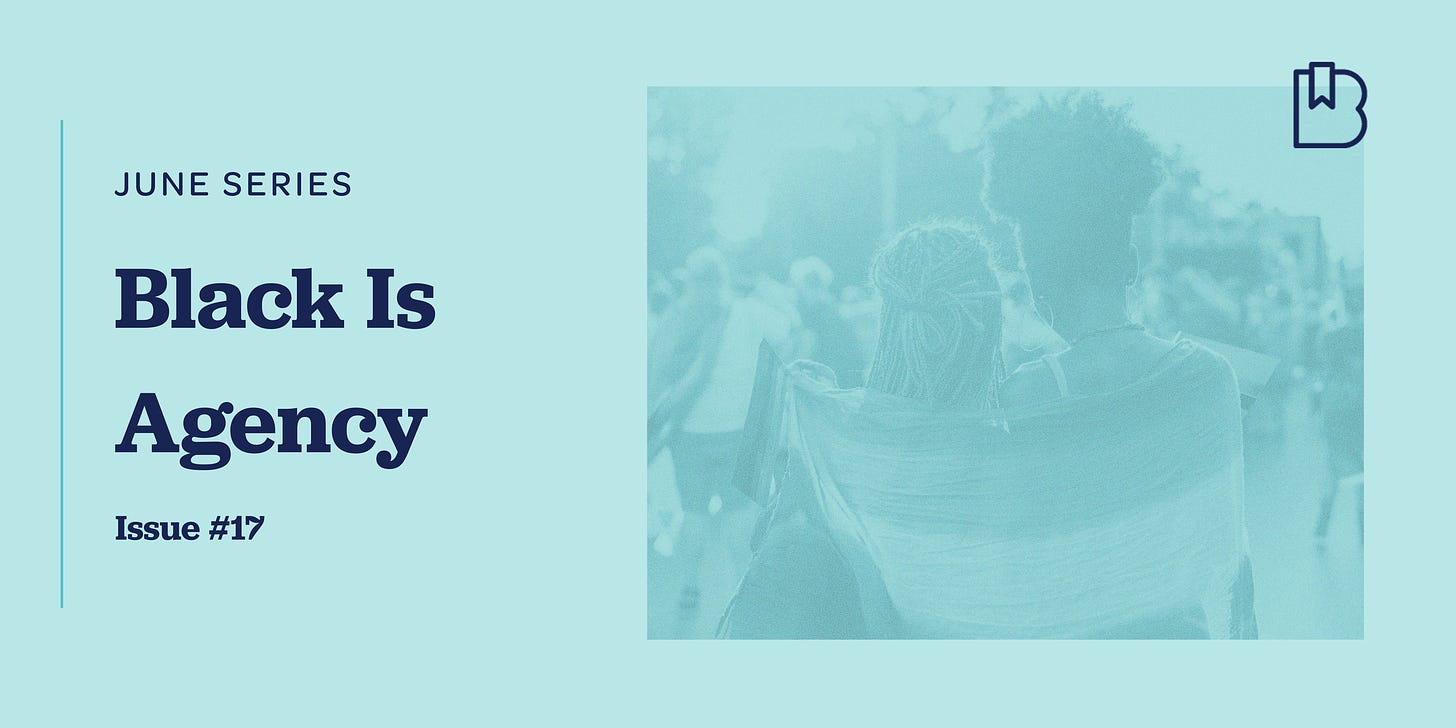Black Is Agency
Welcome to issue #17! 🏳️🌈
June is here. Happy Pride Month! It has also been exactly 1-Year since the Black To School Collective started dreaming and scheming plans for this newsletter. Our theme this month is agency, which is all about exercising our greatest power by learning and (re)telling the human story with Africans and the diaspora at the center.
This month, we are taking you “Behind the Scenes” at Black To School. We are excited to share what our Editorial Team does to develop a storyline, research, design, edit, and deliver this newsletter in your inbox each week.
Black To School celebrates Black people and Black contributions around the world. The “Why?” that powers our mission is simple. “Our ancestors invented the table that the world now sits at. It’s time to not just claim our seat, but to set the agenda.”
If you're new to Black To School, last month, we explored some of our greatest innovations, ranging from the chemistry of fire and the modern conveniences in our homes to the personal computer and clean technology. If you haven’t already subscribed to our weekly newsletter, you can join our growing community here.
A special thanks 🙏🏾 to the “Golden Griots'' (or top sharers) below for spreading the word about last week’s article. Please keep sharing stories of #blackcontributions and our collective history within your networks!
Peter L.
Andrene S.
Elizabeth H.
Jilly P.
In this issue, we’ll:
Discuss how we shape the narrative and remarket what it means to Black.
Take a front row seat and meet those who are on the front lines of telling stories of Black excellence.
Reframing the Conversation
Collective Member: Ama Cobbina
“History is written by the victors.” A saying that has made its way across space and time. Often incorrectly attributed to Winston Churchill who believed it so deeply, he quoted it in a speech to the House of Commons. In addition to the British, the Germans, Italians, French, and Americans all have versions of this quote.
The reason why it has such deep resonance is clear. It grants full and exclusive agency over the historical record as a “spoil of war” to those deemed the “winners”. Yet, there is no shortage of counterpoints about the role “losers” play in writing the history books and how both sides get to give an account of history within their sphere of influence.
On the surface, the premise of that quote is sound, if you narrow your field of vision and think of history as a series of one-off events, ranging from discovery and development to trade and conflict. Those who emerge triumphant with the most money, people, and/or information hold the power and therefore have the final word. Whether it be the Romans, British, French, Americans, or others, they make their version of events most visible and limit your access to the full historical record.
The nagging truth, though, is that history is not a series of incidents with a discrete set of outcomes. Understanding the broader context - past and present - of any single or set of events is critical to creating the right frame for human history. It’s not about any one person, place, or thing. History is an interconnected set of ideas, interests, actions, and events over time that represent the evolution of human consciousness.
Given that notion, the only true way to be on the “losing” side of history is to relinquish your agency by tying your identity to a single or a series of events. Which means that in telling the story of us, we have the freedom to set the clock, define the playing field, develop the rules, assign positions, and call the plays. As we share our history, Africans and the diaspora are and will continue to be lifelong students, trusted historians, and keepers of the global canon.
This is how we do it.
Our charge at Black To School is not simply to tell lesser known stories. It’s about sharing a data-driven narrative that exposes Black excellence as the status quo in a way that forever shifts our own (and the world’s) mindset and behaviors. Below is a rundown of our Editorial Process:
The pitch.
When we think about themes, we’re focused on topics that have gravitas, which means that they are broadly accepted as important fields of knowledge, continue to be studied, and are highly relevant to adults of all ages. Our first four issues focused on Wealth, followed by Analytics, and then Language.
The information is accessible to all regardless of background and education-level. The themes represent enduring areas of thought within which there is always something new to learn that can fundamentally expand your worldview and positively influence your day to day life choices.
Within each theme, we identify story angles that showcase the length of time, depth of contribution, and scale of impact that Africans and the diaspora have had in a particular field. As of this issue, we have covered subjects, ranging from mathematics and science fiction to literature, personal computing, and clean technology. We’re communicating who we are, what we’ve contributed, and the role that we still play in a way that informs current values and priorities.
The conversation.
As a Collective, we come together each week to discuss the pitches for future issues. We dig into the timeliness of the topic, set aside the typical “Black hero worship” angle, and wrestle with a range of perspectives in the public domain.
Our tactic to date, in order to reach the broadest most attentive audience, has been to select themes that “free ride” on the spotlight of National Monthly Celebrations like Black History & Women’s History Month as well National Inventors’ Month and this month, Pride.
The questions that we reflect on and debate are three fold: (1) What are the generally accepted beliefs about the origin story, rules of engagement, and success model within a discipline? (2) Why have these views held up over time and whose interests have been served by it?; and (3) How do they account for the role and contributions of Africa and the diaspora? What do we stand to gain as a society by adjusting this lens?
The outline.
When we are at the end of our open forum dialogue, we find ourselves returning to a few key insights. That is when we know that it is time to document our point of view by drafting the issue outline. Every issue is structured to hit the following notes:
Define excellence in an area of human life.
Share the positive role that Africans and the diaspora continue to play.
Showcase the critical mass that exists in the discipline/industry, across different periods of time, and places around the world.
Reflect on our “but for” impact - then, now, and in the future.
Highlight tools that support deeper intergenerational understanding and engagement with these truths.
Raise awareness about the key success factors and roadmaps for others to build on our great legacy and live up to their highest potential.

The Bottom Line
Our editorial process is a critical part of how we exercise our agency at Black To School. And we’re not alone. We are in great company. There are so many brilliant Black minds working to positively reshape our understanding of the world and each other. From academics and historians like Henry Louis Gates and Robin Walker to passionate, self-taught griots like Akala, Derek Bridges, Elizabeth Leiba, Eunique Jones Gibson, K.B. Taiwo, Michael Lutterodt Quarcoo Amaning, Raiyah and Keighley, Samuel Tholley, and so many more.
When all is said and done, the story of Black people is a story about excellence and humanity. At Black To School, we believe that fact is common sense and we’re on a mission, in collaboration with many others, to make it common knowledge. Black excellence isn’t extraordinary, it is and always has been the norm.
🛠️ The Black To School Toolkit
Now What? Dig Deeper with Friends, Family, and Others.
Want to learn more about the history of human history? Click here to check out the evolution of the historical record? Read this book When We Ruled by Robin Walker for the full story on Black history from ancient to medieval times.
Curious about where else you can get the full story? Check out HomeTeam History and NewAfrica. Two YouTube channels that start from the point of view of “black excellence” and share our lesser known history.
Want some “go-to” Black History resources for kids? KidsBlackHistory is a YouTube channel that is always delivering great, pint size info about Africa and the diaspora for kids ages 2 to 7. Also, Because of Them We Can is a must-have Black History “learn at home” monthly subscription box for kids ages 5 to 12.
Ready for “mind blowing” self-study courses? Register for one of ATCP.co’s legendary Masterclasses and go all the way with Black History Studies’ 30-week Introductory or Advanced courses.
⌛ The Black To School Timeline
Black Excellence Isn’t Extraordinary, It Is And Always Has Been The Norm.
In this issue, we share an overview of our Editorial Process The Point of View: Reframing the Conversation, understanding and curating our story is one of the most powerful ways that we exercise our agency.
Next week, we will expose you to our Research Methods. The Practice: Showing the Evidence, finding and vetting the data and sources is all about pattern recognition and playing hard to get.
About This Week’s Contributor
Ama Cobbina
My name is Ama Cobbina, and I am the founder of mAt design - a marketing and business development consultancy that seeks to develop new combinations of economic and technological tactics in order to develop conscious businesses. I am also a marketing strategist, technologist, life long learner, aspiring space architect and astronaut, and a huge advocate for joy and lazy days.
I am inspired to be part of the visionary power behind Black to School and its mission to provide intergenerational learning. We are excited about normalizing knowledge about the contributions of African and Black thought to our planetary progress. My hope is that as you read our newsletters, engage in the community, and share these ideas, it will support and strengthen your belief in your ability to achieve anything that you can imagine in all the infinite ways to be you.





